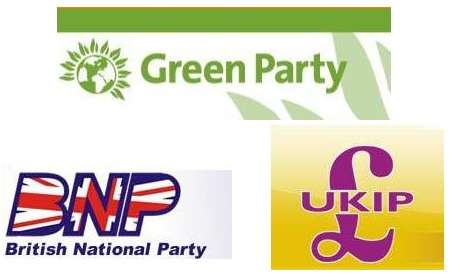Are OTHERS set to do well on May 3rd?

David Herdson asks: Is now their best chance to breakthrough?
The nature of George Galloway’s victory in Bradford West might have been a one-off but the anti-politics mood it fed off is present far more widely. Mike has recently made timely observations that the combined net approval scores for the three leaders with YouGov is at what is probably a record low of -121%, and that despite a rapid drop in government economic trust figures, Labour has barely benefited except in relative terms.
-
It’s very rare for all three main parties to be simultaneously unpopular. Perhaps the only recent parallel was during the Expenses Scandal in 2009, which coated the entire political class with contempt.
The effect of that scandal on people’s voting intention showed up clearly in an increase in support at the time for the minor parties, though ultimately this failed to materialise in the 2010 general election.
Where it did materialise was in the elections that occurred during the scandal – the local and European elections of 2009 (and the reaction to the publicity before and results after these polls may also have fed into the GE VI). The European election was a defeat for all the main parties. Although the Conservatives won, they polled less than 28%. Labour and the Lib Dems did far worse, both coming in behind UKIP. In all, more than two-fifths of the vote went to minor parties.
Against that, it has to be noted that the European elections provide a perfect platform for voters to protest, if they are so inclined. The outcome is not regarded as that important (it’s not like electing a government or even an individual), the PR list means that every voter has the option to vote for any of the larger minor parties as well as some of the very small ones, PR also means that these larger minor parties stand a chance of winning seats in a way they wouldn’t under FPTP (UKIP may well have won seats in 2009 under FPTP but the Greens and BNP wouldn’t have), and it’s also the election on which UKIP have campaigned and which in the absence of more important considerations, some voters wish to send a message.
All those factors mitigate against a breakthrough on anything like the same scale at a parliamentary or even local election for the minor parties. Even so, disillusionment is likely to find an outlet somewhere and if the view is ‘they’re all the same and they’re all useless’, the incentive to vote for the least worst is lessened.
The 2009 European elections coincided with another set of polls, the local elections. Unfortunately in terms of their value to us now, these were mainly in the English shire counties – an almost total contrast to where this year’s local elections take place. Even so, in them minor parties made net gains of more than 40 councillors from the three main parties, adding about a third to their total. In addition, independent or minor party mayors were elected in two of the three contests that year.
So what are the prospects for them this year? One of the biggest barriers is simply being on the ballot paper. The Greens, UKIP and the rest will not be contesting the majority of wards. Galloway’s Respect, which in the immediate aftermath of his triumph he claimed would fight all thirty wards in the Bradford District is in fact contesting only twelve – and virtually none elsewhere.
The one exception, and it’s a big one, is in London, where voters will have the chance to ‘go minor’ in both the mayoral and Assembly elections. While they’ll probably pass up the opportunity in the mayoral poll – Boris and Ken are big characters and somewhat distanced from their Westminster colleagues – there’s a good chance that they’ll perform better in the Assembly poll, where UKIP and the Greens have a full constituency slate, and many parties are standing for the top-up lists.
A second exception, though of a different nature, are the nationalist parties. However, while Plaid and the SNP are minor parties in UK terms, in Scotland and Wales they aren’t – and these are specifically (sub-) Scottish and Welsh polls. For what it’s worth, the SNP can be expected to continue their good run while in Wales, Plaid are unlikely to replicate their nationalist colleagues’ success.
Mid-term governments often suffer unpopularity. When they do, it’s the opportunity for the main or secondary opposition to capitalise. If they can’t, it’s the opportunity for the minor parties but they too need to be in a position to capitalise which is institutionally more difficult for them as any number of inertial factors kick in. Still, this ought to be their best chance for a long time and it will be interesting to see both whether the GE VI polling shifts in the light of it, and whether they can capitalise further at the ballot box.